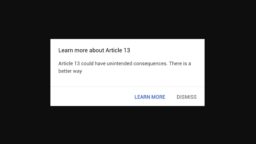The following MBW blog comes from Crispin Hunt (pictured), successful songwriter and Chair of BASCA – the British Association of Composers, Songwriters & Authors.
His focus is Article 13, a provision within the new European Copyright Directive which will prospectively force the likes of YouTube to be held legally accountable for all copyright-infringing material appearing on their platforms (quashing much-argued-about ‘safe harbour’ protections in the EU).
It is anticipated that the European Parliament will have a final vote on the European Copyright Directive next week.
A recent article by Rhett Jones, which appeared in Gizmodo, perfectly encapsulated the feverish disinformation campaign around Article 13 being undertaken by US tech companies and their minions. So I thought it would be worth taking a few minutes to help Parliamentarians to closely examine it.
Let’s start with the title: The End of All That’s Good and Pure About the Internet.
One might be forgiven for thinking that was written ten years ago when the promise of the internet was still bright – and not blighted by things like revenge porn, doxing, phishing, sex trafficking of minors, rampant theft, fake news, interference in elections, massive privacy violations, etc.
But no, Rhett Jones, and the entire campaign against Article 13, is very much premised on this idea that the internet as we know it is “good and pure,” and that any change to its governance would end this wondrous medium.
And so, critics like Jones write or say stuff like: “Memes, news, Wikipedia, art, privacy, and the creative side of fandom are all at risk of being destroyed or kneecapped.”
But of course, this is sheer nonsense. Article 13’s critics are relying wholly on an ability to weave a narrative that has no relationship to fact.
Interestingly enough, Jones himself unintentionally admits as much — noting that “Explaining what’s wrong with the legislation in detail is difficult because the articles themselves are so vague.”
“societies around the world are now very aware of the dangers of ‘alternative facts’.”
For Jones and the other critics of Article 13, this vagueness provides an invitation, indeed a license, to engage in unconstrained hyperbole.
They are hoping that they can re-capture the headiness of the anti-SOPA, anti-ACTA days when policy makers didn’t understand the game and truth was irrelevant.
But we have learned much in the intervening years, and societies around the world are now aware of the dangers of “alternative facts.”
The EU can ill afford to be bullied by incoherent messaging orchestrated arguably by tech titans protecting their unfettered commercial interests by masquerading as ideologists.
The Jones article inadvertently exposes the identity of the real demandeurs in opposing Article 13.
He writes: “By the time Americans woke up on Wednesday, the Legislative Committee had voted on the final form of the EU Copyright Directive.”
It’s as if the EU secretly voted at a time when the real party in interest was sleeping.
How dare they? Doesn’t the EU understand that Silicon Valley makes the rules, particularly with respect to their internet (which also happens to be our internet) and as if the same concerns don’t exist for millions of Americans too?
Silicon Valley and its evangelists appear outraged that we would legislate to protect EU interests. And not in a protectionist manner, I should add.
They are mad that we place value on art, on culture, on diversity. That we demand compliance with the laws. That while we recognise that the internet is indeed exceptional, that we reject the exceptionalism that would place internet-based conduct outside the application of the law.
“Critics of Article 13… hate creative disruption that might restore fairness to a broken market.”
Critics of Article 13 call it “unprecedented.”
Putting aside that moving in unprecedented ways is generally a natural and intended effect of changing the rules, it is more than ironic that Article 13’s critics generally see themselves as supporters of innovation — indeed, even of moving fast and breaking things.
Yet apparently, they hate creative disruption that might restore fairness to a broken market.
The reality is that Article 13 is hardly revolutionary. It is a modest proposal that returns some sense of fairness and responsibility to the manner in which internet platforms operate.
We have had almost 20 years of experience under the existing regime where platforms have almost no accountability to the public, and in which they are rewarded for wilful blindness and inaction.
“For the sake of European culture, our democratic political institutions, and our economic well-being, reject the incoherent anti-Article 13 lobbying.”
So, I ask each of you in Parliament who will be called upon to vote on Article 13, do you agree that the internet as we know it today is “good and pure”? So good in fact that any change to it would be ruinous?
I can’t imagine that even a single member of Parliament – not even Julia Reda – believes this is the case.
So, for the sake of European culture, our democratic political institutions, and our economic well-being, reject the incoherent anti-Article 13 lobbying.
It is not directed from within our borders, and doesn’t have the EU’s interests in mind.
They are trafficking in fear. I ask you to vote for our dreams.Music Business Worldwide




